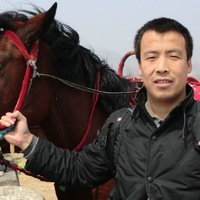
Ma Qiang
Prof. Dr. Ma Qiang (Muslim name is Ramadan) is a professor and supervisor of graduate students (Ph. D and MA) in Institute for Western Frontier Region of China, Shaanxi Normal University, Xi’an city, China. He graduated with a Bachelor of History Degree and Master of Philosophy (Majoring in Comparative Religions Study) from Northwest Minorities University in Lanzhou, and obtained his Ph.D. in Anthropology of Religion from Sun Yat-Sen University in Guangzhou. He got Asia Scholarship Foundation in 2008 and conducted his research in Malaysia for 10 months. He also got Program for New Century Excellent Talents in University (NCET) from the Ministry of Education of the People’s Republic of China in 2012. He was selected as a Senior Visiting Fellow to California University, Berkeley by China Scholarship Council. He had also been a Senior Visiting Fellow at the King Faisal Center for Research and Islamic Studies, Riyadh, Saudi Arabia in 2017. He has published more than 90 academic essays and 6 books in Chinese. The influential books include:Moving Spiritual Community: An Anthropological Study on Muslim Jamā’at of Guangzhou (China Social Science Press, 2006). Internal and External Xi’an Hui Muslim Quarter: Islam Encounters Urban Modernization (Beijing: Chinese Social Science Publishing House, 2011). Transcending Boundaries: A Comparative Research on Muslim Converts in China and Malaysia (Gansu Minzu Publishing House, 2013). Insights from the Field: Selected Essays on Anthropology of Islam, Qinghai People’s Publication House, 2015. Ethnography on Xiaohe Great Mosque in Xiji County of Ningxia Hui Autonomous Region, Ningxia People’s Publication House, 2017.His academic interests focus on Anthropology of Religion and Ethnology. He teaches Anthropology, Ethnography, An Guide to Chinese Islamic Literature, Anthropology of Islam, and Ethnic Groups and Religions on CPEC (China Pakistan Economic Corridor) for post graduates. He was invited by SOAS (University of London), Toyo Bunko (Japan), UIA (Malaysia), ; and the Forum for Arab and International Relations (Qatar), etc., to give talk in different international conferences.
Supervisors: Supervisor of Ph. D candidate
Supervisors: Supervisor of Ph. D candidate
less
InterestsView All (7)
Uploads
Papers by Ma Qiang
Ma Qiang (Institute for Western Frontier Region of China, Shaanxi Normal University, Xi’an, China, 710062)
Abstract: The concept of sinicization of Islam is a historical, geographical, ethnical and religious sectarian discourse which includes the sinicization of multi-ethnic China. The main point lies on adopting appropriate local styles to present, understand and interpret Islam according to the geographical cultures rather that de-religionization or de-Islamization. The pre-existing achievement of sinicization is the life wisdom of Chinese Muslims. The interdependence between the nation state and the religion, and loving the country and loving the religion are the basements of sinicization of Islam. It is worth noting that when observing the exterior religious symbols in the process of interpreting the sinicization of religion, the interior spirit and echoes should be emphasized simultaneously.
Key Words: Islam, sinicization, localization, de-religionization
Ma Qiang, Fan Jing
Abstract: Xiaohe Masjid has been the leading Hayy Masjid of Ikhwan in Xiji County, Ningxia Hui Autonomous Region, the economy of which manifests its distinctive periodical features over the 30-years of Reform and Opening up. Such perspectives as the people’s migration, the Mosque’s economic capacity, the ideology and regularity of management, the non-agricultural features and diversity of Zakat, the intercommunication among same religious sect and organization, the allowance of the Imam, and so forth, are the multi-dimensional perspectives to observe the contemporary Masjid economy, Islamic education, and social transformation in South mountain area of Ningxia.
Books by Ma Qiang
Ma Qiang (Institute for Western Frontier Region of China, Shaanxi Normal University, Xi’an, China, 710062)
Abstract: The concept of sinicization of Islam is a historical, geographical, ethnical and religious sectarian discourse which includes the sinicization of multi-ethnic China. The main point lies on adopting appropriate local styles to present, understand and interpret Islam according to the geographical cultures rather that de-religionization or de-Islamization. The pre-existing achievement of sinicization is the life wisdom of Chinese Muslims. The interdependence between the nation state and the religion, and loving the country and loving the religion are the basements of sinicization of Islam. It is worth noting that when observing the exterior religious symbols in the process of interpreting the sinicization of religion, the interior spirit and echoes should be emphasized simultaneously.
Key Words: Islam, sinicization, localization, de-religionization
Ma Qiang, Fan Jing
Abstract: Xiaohe Masjid has been the leading Hayy Masjid of Ikhwan in Xiji County, Ningxia Hui Autonomous Region, the economy of which manifests its distinctive periodical features over the 30-years of Reform and Opening up. Such perspectives as the people’s migration, the Mosque’s economic capacity, the ideology and regularity of management, the non-agricultural features and diversity of Zakat, the intercommunication among same religious sect and organization, the allowance of the Imam, and so forth, are the multi-dimensional perspectives to observe the contemporary Masjid economy, Islamic education, and social transformation in South mountain area of Ningxia.